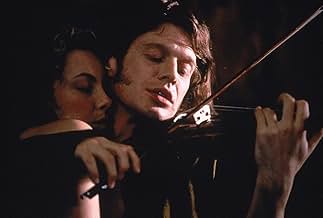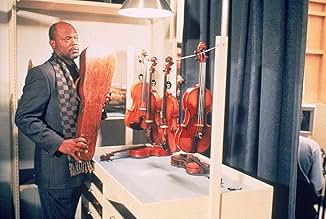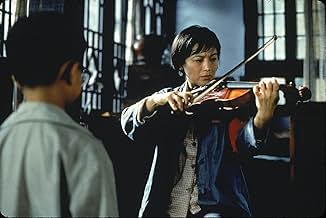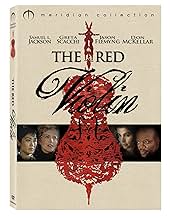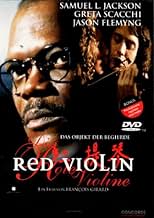IMDb-BEWERTUNG
7,6/10
35.250
IHRE BEWERTUNG
Eine rote Geige weckt Leidenschaft, bahnt sich ihren Weg durch drei Jahrhunderte über mehrere Besitzer und Länder und landet schließlich bei einer Auktion, wo sie möglicherweise einen neuen ... Alles lesenEine rote Geige weckt Leidenschaft, bahnt sich ihren Weg durch drei Jahrhunderte über mehrere Besitzer und Länder und landet schließlich bei einer Auktion, wo sie möglicherweise einen neuen Besitzer findet.Eine rote Geige weckt Leidenschaft, bahnt sich ihren Weg durch drei Jahrhunderte über mehrere Besitzer und Länder und landet schließlich bei einer Auktion, wo sie möglicherweise einen neuen Besitzer findet.
- Regie
- Drehbuch
- Hauptbesetzung
- 1 Oscar gewonnen
- 20 Gewinne & 19 Nominierungen insgesamt
Empfohlene Bewertungen
This is art. Real art. So few films try for this much.
My sadness is that its appeal will be limited to polyglots, musicians, and lovers of costume drama. It's worth so much more than that. Beautifully shot, sensitively scripted and acted, and cleverly executed, this deserves more awards and greater coverage than it's going to get.
9 out of 10. I dock one point because Girard occasionally lets the pace drop to deadly, and because Jason Flemyng and Greta Scacchi irritated me beyond words - but that's not Girard's fault.
My sadness is that its appeal will be limited to polyglots, musicians, and lovers of costume drama. It's worth so much more than that. Beautifully shot, sensitively scripted and acted, and cleverly executed, this deserves more awards and greater coverage than it's going to get.
9 out of 10. I dock one point because Girard occasionally lets the pace drop to deadly, and because Jason Flemyng and Greta Scacchi irritated me beyond words - but that's not Girard's fault.
The Red Violin is the saga of spirit and soul as they press onward through time. The adventure begins with Anna, a young woman whose only child brings about her untimely death. A gift of a violin to be given to the babe becomes host to Anna's spirit. The Red Violin narrowly escapes the grips of greed, ignorance, and vengeful lust as she is passed from hand to hand of those who would have her. She wanders about the globe until at last she is exonerated by the one man who knows the truth that she holds within her wooden belly.
In spite of the death and despair, the film is truly positive. It teaches us to appreciate people from all walks of life. From the violin maker of the 16th century who made the Red Violin for the bittersweet arrival of his baby son, we travel through time with the violin to the Chinese Communist Party who spelled out certain death to any instrument that may threaten the ideals of the collective. In our travels, we learn the dark and sordid side to each person, but we also learn that to create a shadow there must be light. That light, or hope, that the people shed is what gives the violin her vitality and will to survive.
A truly magnificent film, The Red Violin inspired me to recollect my own past I shared with my aged upright piano; the certain spiritual vibrations I felt while playing a ragtime melody. Suddenly, memories came rushing back to me tenfold. I recalled the times as a young girl I would listen as my father played his rendition of Scott Joplin's Maple Leaf Rag. Wiping a tear from my eye, I remembered how long ago that truly was; how my piano shaped and molded me, as I shaped and molded it. I am left wondering where my beloved piano is now. Who is influencing his instrumental life? In the end, what stories will he have to tell, and will they be of me
Take the journey of the Red Violin. Visit other lands and other times. Feel the strings of life against your fingers; the bow of spirit in your palm. Rest your chin against the weathered wood of wisdom. Listen closely and hear the music that is the gentle rhythm of time and change. See the film to learn about music; to learn about history; to learn the boundless raptures of the spirit. Perhaps, as I, you will learn just a little more about yourself.
In spite of the death and despair, the film is truly positive. It teaches us to appreciate people from all walks of life. From the violin maker of the 16th century who made the Red Violin for the bittersweet arrival of his baby son, we travel through time with the violin to the Chinese Communist Party who spelled out certain death to any instrument that may threaten the ideals of the collective. In our travels, we learn the dark and sordid side to each person, but we also learn that to create a shadow there must be light. That light, or hope, that the people shed is what gives the violin her vitality and will to survive.
A truly magnificent film, The Red Violin inspired me to recollect my own past I shared with my aged upright piano; the certain spiritual vibrations I felt while playing a ragtime melody. Suddenly, memories came rushing back to me tenfold. I recalled the times as a young girl I would listen as my father played his rendition of Scott Joplin's Maple Leaf Rag. Wiping a tear from my eye, I remembered how long ago that truly was; how my piano shaped and molded me, as I shaped and molded it. I am left wondering where my beloved piano is now. Who is influencing his instrumental life? In the end, what stories will he have to tell, and will they be of me
Take the journey of the Red Violin. Visit other lands and other times. Feel the strings of life against your fingers; the bow of spirit in your palm. Rest your chin against the weathered wood of wisdom. Listen closely and hear the music that is the gentle rhythm of time and change. See the film to learn about music; to learn about history; to learn the boundless raptures of the spirit. Perhaps, as I, you will learn just a little more about yourself.
I saw this film the same day it came highly recommended to me by a coffee shop friend who couldn't stop gushing about it. While this guy is also a member of the Academy and has steered me to some pretty good picks in the past, I walked into the theater fearing the usual letdown that invariably follows going into a film with overly high expectations (i.e. The English Patient, The Truman Show, etc.) This film not only managed to exceed my expectations, it restored my faith in the magic and mystery of cinema altogether.
We start with a rather simple but cleverly structured story about a very unique red violin that emblematically (and quite literally for that matter) takes on the heart and fate of a 16th century Italian woman as it passes across several centuries and continents on its way to the auction block in present day Montreal. The unfolding vignettes reveal more and more about the nature of this instrument and, when strung together in the bigger picture, play out like finely orchestrated movements of a great sonata; each movement plucking out its own stirring and poignant variation on theme. I was so swept up in the majesty and spectacle of this film that it didn't even occur to me until much later that the violin is nothing less than a personification of beauty itself (okay, okay, maybe I'm starting to overly deconstruct things here in retrospect, but the parallels are too perfect to remain unexplored). It's fascinating to watch both the transformative and destructive power of this beauty as it's placed into the hands of a sensitive young boy, a self absorbed musical protege, and a remorseful ring leader of a totalitarian regime. Much praise goes to director Francois Girard in how he refrained from overplaying the social and moral commentary, repeating this theme at mostly an emotional level rather than an intellectual one -- much in the same way that beauty itself, to some degree anyway, defies analytical discussion and belongs in the realm of pure and simple experience. You obviously can't dissect it, as co-writer Don McKellar¹s onscreen character thought to do, and so it remains as it was in it's original form: timeless, magical, elusive. The stuff that pompous nobility and rich collectors the world over will offer a king's ransom for and still never manage to posses in the end.
Performances were good to great all around. It's hard to go wrong with Samuel L. Jackson in a leading role and I appreciated the fact that the actors actually appeared to be playing the violin on camera, as opposed to watching the typical hokey cutaways and cheat shots often associated with onscreen musical performances; nauseating contrivances that always tear down the wall of suspended disbelief with a resounding crash. The costuming, set design and cinematography were absolutely stunning (Oscar nominations soon to follow I'm sure) without taking center stage from the story. I especially loved the amazing period recreations of China and Austria. I felt like I was fully transported in both space and time to these places and walking among people who really belonged there.
Overall I would rate this one as a true film classic on the level of masterpiece. Perhaps this is in part due to my love for music and the undeniable fact that, being the sentimental guy that I am, I'm always a sucker for haunting open-ended films like this where you leave the theater in a half daze, pondering all the implications, mesmerized by the lingering imagery. I'm still speculating about the future of Mr. Moritz and what will ultimately happen when beauty is placed into the hands of our modern world.
We start with a rather simple but cleverly structured story about a very unique red violin that emblematically (and quite literally for that matter) takes on the heart and fate of a 16th century Italian woman as it passes across several centuries and continents on its way to the auction block in present day Montreal. The unfolding vignettes reveal more and more about the nature of this instrument and, when strung together in the bigger picture, play out like finely orchestrated movements of a great sonata; each movement plucking out its own stirring and poignant variation on theme. I was so swept up in the majesty and spectacle of this film that it didn't even occur to me until much later that the violin is nothing less than a personification of beauty itself (okay, okay, maybe I'm starting to overly deconstruct things here in retrospect, but the parallels are too perfect to remain unexplored). It's fascinating to watch both the transformative and destructive power of this beauty as it's placed into the hands of a sensitive young boy, a self absorbed musical protege, and a remorseful ring leader of a totalitarian regime. Much praise goes to director Francois Girard in how he refrained from overplaying the social and moral commentary, repeating this theme at mostly an emotional level rather than an intellectual one -- much in the same way that beauty itself, to some degree anyway, defies analytical discussion and belongs in the realm of pure and simple experience. You obviously can't dissect it, as co-writer Don McKellar¹s onscreen character thought to do, and so it remains as it was in it's original form: timeless, magical, elusive. The stuff that pompous nobility and rich collectors the world over will offer a king's ransom for and still never manage to posses in the end.
Performances were good to great all around. It's hard to go wrong with Samuel L. Jackson in a leading role and I appreciated the fact that the actors actually appeared to be playing the violin on camera, as opposed to watching the typical hokey cutaways and cheat shots often associated with onscreen musical performances; nauseating contrivances that always tear down the wall of suspended disbelief with a resounding crash. The costuming, set design and cinematography were absolutely stunning (Oscar nominations soon to follow I'm sure) without taking center stage from the story. I especially loved the amazing period recreations of China and Austria. I felt like I was fully transported in both space and time to these places and walking among people who really belonged there.
Overall I would rate this one as a true film classic on the level of masterpiece. Perhaps this is in part due to my love for music and the undeniable fact that, being the sentimental guy that I am, I'm always a sucker for haunting open-ended films like this where you leave the theater in a half daze, pondering all the implications, mesmerized by the lingering imagery. I'm still speculating about the future of Mr. Moritz and what will ultimately happen when beauty is placed into the hands of our modern world.
Literally spanning centuries to unfold its mesmerizing tale, The Red Violin traces the unbelievable history of an acoustically flawless masterpiece crafted in the late 1600s by an Italian master. Co-screenwriters Francois Girard (who directed) and Don McKellar (who acts in the film) structure the movie around a wealth of richly detailed locales, including Vienna, China, and Oxford, and provide a unique modern-day Montreal framework which intertwines with the often tragic history of the instrument to provide the narrative with a rather unique element of mystery. The late-19th century English section shows the film at its most baroque, but each of the finely tuned tales reaches for some truth about music, life, love, and passion -- and that is commendable. Music lovers take note: the sounds that come out of the crimson treasure throughout the course of its journey are utterly thrilling and inspiring.
I was captivated from the moment the film started. The music flowed effortlessly and the scene was set immediately.
Some people may be put off by the use of foreign language and subtitles early on in the film but I found this served to enhance the story and grab my attention even more. It reminds you of the true beauty of language and music and no matter what your taste you cannot help but to be drawn into the story.
The story follows the journey of the Red Violin from its creation and you really feel that something special is happening from the way the red violin is revered. The different people who come into contact with the instrument all have there own stories and you find yourself trying to guess how the Violin will affect them. Sometimes you are right and sometimes not.
Francois Girard has produced a wonderful film and the original score enhances this. This film is one that I will watch again and again and one that should be highly recommended.
Some people may be put off by the use of foreign language and subtitles early on in the film but I found this served to enhance the story and grab my attention even more. It reminds you of the true beauty of language and music and no matter what your taste you cannot help but to be drawn into the story.
The story follows the journey of the Red Violin from its creation and you really feel that something special is happening from the way the red violin is revered. The different people who come into contact with the instrument all have there own stories and you find yourself trying to guess how the Violin will affect them. Sometimes you are right and sometimes not.
Francois Girard has produced a wonderful film and the original score enhances this. This film is one that I will watch again and again and one that should be highly recommended.
Wusstest du schon
- WissenswertesChristoph Koncz (as Kaspar Weiss the orphan virtuoso) was only nine years old when featured in this movie. He is an Austrian-Hungarian classical musician that became an internationally-renowned violinist and conductor.
- PatzerThe substance used to give the violin its color would not actually work in real life. The substance does not mix into varnish, and would quickly coagulate and oxidize to a dark brown or black color if it were actually used as the movie implies.
- Zitate
Charles Morritz: What do you do when the thing you most wanted, so perfect, just comes?
- SoundtracksO Richard! O mon Roi!
from "Richard Coeur de Lion"
Composed by André-Modeste Grétry
Top-Auswahl
Melde dich zum Bewerten an und greife auf die Watchlist für personalisierte Empfehlungen zu.
- How long is The Red Violin?Powered by Alexa
- How did the violin get into China?
- Is "The Red Violin" based on a book?
- Is "Le Violon Rouge" in French?
Details
- Erscheinungsdatum
- Herkunftsländer
- Sprachen
- Auch bekannt als
- El violín rojo
- Drehorte
- Produktionsfirmen
- Weitere beteiligte Unternehmen bei IMDbPro anzeigen
Box Office
- Budget
- 18.000.000 $ (geschätzt)
- Bruttoertrag in den USA und Kanada
- 10.019.109 $
- Eröffnungswochenende in den USA und in Kanada
- 47.415 $
- 8. Nov. 1998
- Weltweiter Bruttoertrag
- 10.019.109 $
- Laufzeit2 Stunden 10 Minuten
- Farbe
- Sound-Mix
- Seitenverhältnis
- 1.85 : 1
Zu dieser Seite beitragen
Bearbeitung vorschlagen oder fehlenden Inhalt hinzufügen



